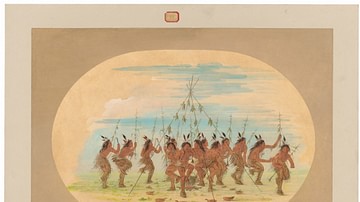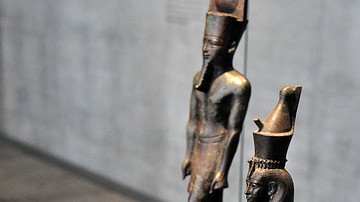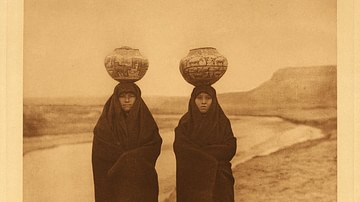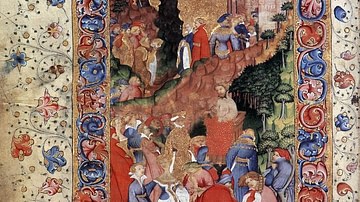The Origin of Game and Corn is a Cherokee origin myth explaining how wild game first began to run free and corn came to be cultivated. The central figures of Kenati (also given as Kana'ti) and Selu are the embodiment of the Lucky Hunter and Corn, respectively, while the two boys represent transformation.
Wild Boy and Good Boy (known as the Little Men) are trickster figures, popular in Native American literature, whose actions might at first seem harmful or malicious but, in time, prove beneficial to the whole community or even the world. Their curiosity as to how their father always manages to come home with game and how their mother produces endless supplies of corn and beans from the small storehouse leads to events which initially seem tragic but are necessary for the world to function as it does.
In Cherokee lore, Selu was the first woman, created from corn to help restore the balance that had been thrown off by Kenati through his lack of understanding and improper behavior. Kenati had been alone for too long and, becoming bored, had fallen into lethargy and bad habits. Selu helped to restore his balance, but the actions of the two boys force Kenati to abandon the life he has grown comfortable with and engage with the larger world. Selu, through her death, ensures her children – and, by extension, everyone's children – would never go hungry. The couple and their two boys, therefore, shape the world as it was known to the Cherokee.
The Cherokee, like many – if not all – Native American Nations, believe the world functions in harmony as established by the Great Spirit and this balance is only thrown off by the actions of humans who fail to align their lives with the energies of nature. All that happens naturally, therefore, is what should happen, and this story explains how an essential aspect of life – the primary food sources of game and corn – came to be. The two boys are therefore not "bad" (as Kenati calls them) but necessary as they establish a world in which a hunter must work to acquire the essential skills required in bringing home game, and those tasked with cultivating crops like corn and beans must do the same. In this way, one is rewarded for the effort one has made in life, which shapes and colors the nature of one's soul.
Text
The following is taken from Voices of the Winds: Native American Legends, edited by Margot Edmonds and Ella Clark. The story appears in English as Kana'ti and Selu: Origin of Corn and Game in Myths of the Cherokee (1900) by the American ethnographer James Mooney (l. 1861-1921), translated from the original language by Will West Long (l. c. 1869-1947), the famous Cherokee translator, mask-maker, and historian. Myths of the Cherokee was first published as part of the Nineteenth Annual Report of the Bureau of American Ethnology to the Secretary of the Smithsonian Institution, 1897-1898. The story also appeared, under its present title, in the Journal of American Folklore c. 1888.
A longer version of the work, in which the two boys go on to further adventures, is listed below in the bibliography. In that version, the boys kill their mother, heightening the tragic aspects of the tale, while, in the following story, Selu dies of natural causes. The death of the Corn Mother is a common motif in Native American literature as the seed must fall to the earth and die to generate new life.
Long ages ago, soon after the world was made, Kenati, a Cherokee Indian hunter and his wife Selu, lived on Looking-glass Mountain in North Carolina. They had a little son named Good Boy.
Whenever Kenati hunted in the woods, he always brought back all the game his family needed. His wife cut up the meat and washed it in the river not far from their lodge. Good Boy played near the river almost every day. One day his parents thought they heard laughing in the bushes, as if there were two children playing there.
That evening Kenati asked his son, "Who were you playing with today down by the river?"
"He is a boy who comes out of the water and calls himself my elder brother," replied Good Boy.
When Selu washed game in the river again, the parents thought the water boy must grow from the animal blood. She never saw the water boy because, as she approached, he disappeared.
One evening, Kenati said to his son, "Tomorrow when your playmate comes out of the water, wrestle with him and hold him down and call me, so we can come and see him." Good Boy promised to do as his father asked.
Next day a wrestling match took place between the two boys. Kenati and Selu were not far away, and at the first call from their son, they ran to see the boy from the river. Compared with Good boy, the other one looked wild.
"Let me go! Let me go!" he cried out. Good Boy held him down until his parents arrived. They took the water boy home with them.
The family kept the wild one in the house for some time, trying to tame him. But he was always disagreeable in his disposition and tried to lead Good Boy into mischief. The family discovered that wild one possessed some magic powers, so they decided to keep him. They named him Wild Boy.
Always Kenati came home from hunting with a large fat deer on his back. Always he was lucky with game. One day Wild Boy said to his brother, "I wonder where our father finds so much game? Let's follow him next time."
In a few days, Kenati took his bow and arrows and went hunting. Shortly afterward the boys followed. Staying out of sight, they saw their father go into a swamp where some strong reeds were growing. With these, hunters usually made arrow shafts. Wild Boy changed himself into a puff of bird's down. A little wind carried him up and onto Kenati's shoulder. There he watched where Kenati went and what he did. The father was not aware of Wild Boy's presence on his shoulder as he gathered reeds and fitted them with feathers.
"I wonder what those things are for?" thought Wild Boy to himself. Kenati came out of the swamp and went on his way into the woods. The wind carried the down off Kenati's shoulders and soon Wild Boy was his normal self again. Still keeping out of sight of their father, the two brothers followed him into the mountains.
When Kenati reached a certain place, he stopped and lifted a large rock. At once, a large buck deer came running out of the hole. Kenati shot it and lifted it upon his back, starting home with his prize.
"Oho!" said the boys. "He keeps the wild animals shut up inside a cave until he needs them. He then kills the game with those things he made in the swamp." They hurried to reach home before their father arrived with his heavy load.
The very next day, the boys wanted to see if they could do as their father had done. First, they went to the swamp and made some arrows. When they came to the big rock, they lifted the cover and instantly a deer ran out, but they forgot to replace the cover.
As they made ready to shoot the deer, another deer came out of the hole, then another, and another–the boys became so confused they forgot what to do next.
Long ago, a deer's tail stuck straight out from his body. When Wild Boy struck at a deer's tail with an arrow, the tail stood straight up. The boys thought it great fun. As another deer ran by, Good Boy swung at it with an arrow so hard that the tail curled over the deer's back. Since that time most deers' tails curl at the end.
All of the deer in the cave came out and disappeared into the forest. Following them were raccoons, rabbits, and all the other four-footed animals. Last came turkeys, partridges, pigeons, and other winged creatures. They darkened the air as they flew away. Such a noise arose that Kenati heard it at his lodge. To himself he said, "I must go to see what trouble my boys have stirred up."
Kenati went to the mountain, to the place of the large rock. There stood the two boys, but all the animals and birds were gone. Kenati was furious with them but said nothing. He went into the cave and kicked off the covers of four large jars that stood in the back corner.
Out of the jars swarmed bedbugs, lice, and gnats that attached the two boys. they screamed from terror as they tried to beat off the insects. Bitten and stung, the boys dropped to the ground from exhaustion.
When Kenati thought they had learned their lesson, he brushed away the pests. "Now you rascals," he scolded them. "You have always had plenty to eat without working for it. When we needed game, all I had to do was to come up here and take home just what we needed. Now you have let all of the game escape. From now on when you are hungry, you will have to hunt throughout the woods and mountains and then not find enough game."
The two boys went home and asked their mother for something to eat.
"There is no more meat," said Selu. "I will go to the storehouse and try to find something."
She took her basket and went to the two-story provision house set upon poles high above the ground, out of reach of most animals.
Every day before the evening meal, Selu climbed the ladder to the one opening. She always came back with her basket full of beans and corn.
"Let's go and see where she gets the corn and beans," urged Wild Boy to his brother. They followed Selu and climbed up in back of the storehouse. They removed a piece of mud from between the logs and looked through the crack. There stood Selu in the middle of the room with her basket on the floor. When she rubbed her stomach, the basket was half-filled with corn. When she rubbed her legs, the basket was full to the top with beans. Wild Boy said, "Our mother is a witch. Maybe her food will poison us."
When Selu came back to the house, she seemed to know what the boys were thinking. "You think I am a witch?"
"Yes, we think you are a witch," Wild Boy replied.
"When I die, I want you boys to clear a large piece of ground in front of our lodge. Then drag all of my clothes seven times around the inside of the circle. If you stay up all night and watch, next morning you will be rewarded with plenty of corn."
Soon thereafter Selu became ill and died suddenly. The boys set to work clearing the ground as she had said. But instead of the whole piece of ground in front of the lodge, they only cleared seven small spots. This is why corn does not grow everywhere in the world.
Instead of dragging Selu's clothing seven times, they only went around the circle twice, outside and inside the circle. The brothers watched all night, and in the morning there were fully grown beans and corn, but only in the seven small spots.
Kenati came home from a long hunting trip. He looked for Selu but could not find her. When the boys came home, he asked them, "Where is your mother?"
"She turned into a witch and then she died," they reported. Kenati was saddened by the news.
"I cannot stay here with you any longer. I will go and live with the Wolf people," he said.
He started on his journey. Wild Boy changed himself into a tuft of bird's down and settled upon Kenati's shoulder to learn where he was going.
When Kenati reached the settlement of the Wolf people, they were having a council in their townhouse. He went in and sat down with the tuft upon his shoulder. Wolf Chief asked Kenati what was his business.
"At home I have two bad boys. In seven days, I want you to go and play a game of ball with them."
The Wolf people knew that Kenati wanted them to punish the boys and promised to go in seven days. At that moment the down blew off of Kenati's shoulder and the smoke carried it up and through the smoke hole in the roof. It came down to the ground outside, where Wild Boy resumed his own shape and ran home fast to tell his brother. Kenati did not return but went on to visit another tribe.
The two brothers prepared for the coming of the wolves. Wild Boy the magician told his brother what to do. Together they made a path around the house, leaving an opening on one side for the wolves to enter.
Next, they made four large bundles of arrows. These they placed at four different points on the outside of the circle. Then they hid themselves in the woods nearby and waited for the wolves.
At the appointed time, a whole army of wolves surrounded the house. They came in the entrance the boys had made. When all were within, Wild Boy magically made the pathway become a high fence, trapping the wolves inside.
The two boys on the outside began shooting arrows at the wolves. Since the fence was too high for the wolves to jump over, they were trapped, and most were killed.
Only a few escaped through the entrance and made their way into a nearby swamp. Three or four wolves eventually survived. These were the only wolves left alive in the world.
Soon thereafter, some strangers came from a great distance to learn about the brothers' good grain for eating and making bread. Only Selu and her family had the corn secret.
The two brothers told the strangers how to care for the corn and gave them seven kernels to plant the next night on their way home. They were advised that they must watch throughout the night, then the following morning they would have seven ears of corn. This they should do each night, and by the time they reached home, they should have enough corn for all their people to plant.
The strangers lived seven days' distance. Each night they did as the brothers had instructed them. On the last night of the journey, they were so tired that they fell asleep and were unable to continue the whole night's watch. Next morning, the corn had not sprouted and grown as on the previous six nights.
Upon arriving in their own village, they shared all the corn they still had left with their people. They explained how the two brothers told them the way to make the corn prosper. They watched over the planting with care and attention. A splendid crop of corn resulted. Since then, however, the Cherokee Indians needed to tend their corn only half the year to supply their people.
Kenati never came back to his home. The two brothers decided to search for him. Wild Boy sailed a magic disk to the northwind and it returned. He sailed it to the southwind and it returned, but it did not return from the eastwind. They knew that was where their father was living. They walked a long, long time and finally came upon Kenati with a dog walking by his side.
"You bad boys," rebuked Kenati. "Why have you followed me here?"
"We are men now," they replied. "We plan to accomplish what we set out to do." Wild Boy knew that the dog was the magic disk that had not returned and had become a dog only a few days ago.
Kenati's trail led to Selu, waiting for him at the end of the world where the sun comes up. All seemed glad to be reunited for the present.
Their parents told the two brothers that they must go to live where the sun goes down. In seven days, the two boys left for the Land of the Setting-Sun. There they still live, overseeing the planting and the care of corn.
The brothers still talk about how Selu brought forth the first corn from her seed. Since that time, the Cherokee tribe refer to her as the "Corn Woman."







